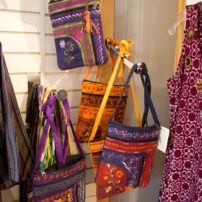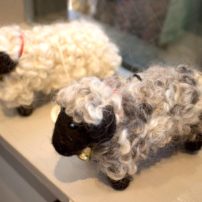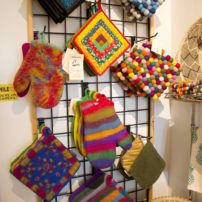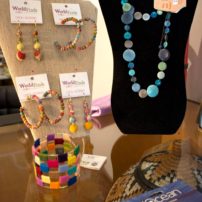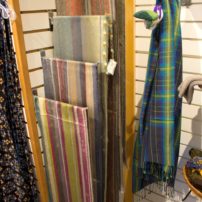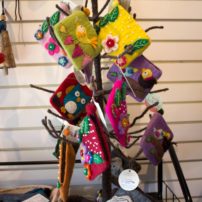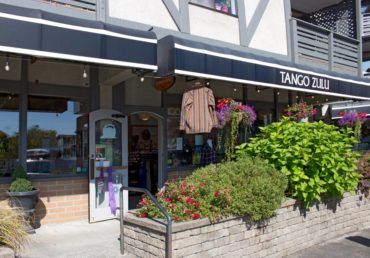 How did codes of the International Radiotelephony Spelling Alphabet inspire the name of a pair of globally sourced fair-trade shops operating on Port Gamble and Winslow’s main drags? According to Tracy Zhu, owner of the two Tango Zulu shops, it was her search for an exotic name that matched her initials and the far-flung origins of the stores’ handcrafted inventory.
How did codes of the International Radiotelephony Spelling Alphabet inspire the name of a pair of globally sourced fair-trade shops operating on Port Gamble and Winslow’s main drags? According to Tracy Zhu, owner of the two Tango Zulu shops, it was her search for an exotic name that matched her initials and the far-flung origins of the stores’ handcrafted inventory.
The Tango Zulu tagline, “Fair Trade, Well Made,” speaks to Zhu’s values and the nine-year success of a local small business that supports artists and craftspeople in developing nations.
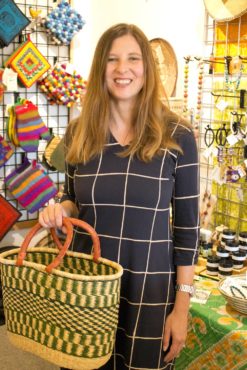
Crossing the threshold of both the Port Gamble or Bainbridge store is akin to entering a tiny Silk Road market. Inside, shelves and racks display artisan-made merchandise from different lands.
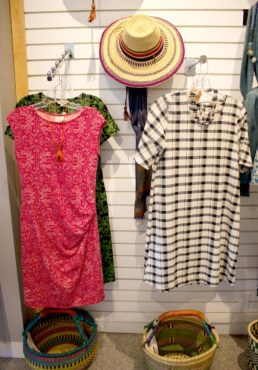 There are vibrantly colored Zulu baskets constructed from telephone wire, upcycled 3-D wall hangings of the Andes landscape sewn by displaced Peruvian seamstresses, and cotton batik dresses handmade in women’s co-ops in India and Ghana. There are also seasonal gift ideas — felt yurt tree ornaments handsewn in Kyrgyzstan, knit Christmas stockings from Nepal and from Thailand and stocking-stuffer string-doll keychains of Rosie the Riveter and Ruth Bader Ginsburg.
There are vibrantly colored Zulu baskets constructed from telephone wire, upcycled 3-D wall hangings of the Andes landscape sewn by displaced Peruvian seamstresses, and cotton batik dresses handmade in women’s co-ops in India and Ghana. There are also seasonal gift ideas — felt yurt tree ornaments handsewn in Kyrgyzstan, knit Christmas stockings from Nepal and from Thailand and stocking-stuffer string-doll keychains of Rosie the Riveter and Ruth Bader Ginsburg.
Unlike large commercial stores carrying imported home goods and clothing, Zhu’s stores practice a personalized fair-trade retail model that ensures fair wages for the artisans and craftspeople who produce her inventory, as well as customer education about the products.
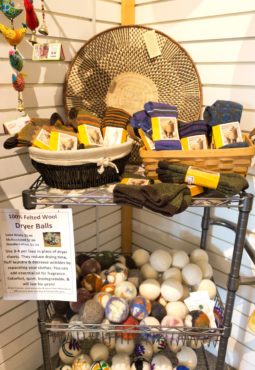 Customers don’t just pluck a brown basket off a shelf and pay for it at the cash register. They find, when purchasing a Tango Zulu basket, that it’s a basket made by Africa’s Zulu people to store and carry liquids. That it’s called an Ukhamba and, in Africa, is commonly given as a wedding gift. And they may discover that their purchase keeps a fading craft skill alive as well as providing an income for a rural Zulu family.
Customers don’t just pluck a brown basket off a shelf and pay for it at the cash register. They find, when purchasing a Tango Zulu basket, that it’s a basket made by Africa’s Zulu people to store and carry liquids. That it’s called an Ukhamba and, in Africa, is commonly given as a wedding gift. And they may discover that their purchase keeps a fading craft skill alive as well as providing an income for a rural Zulu family.
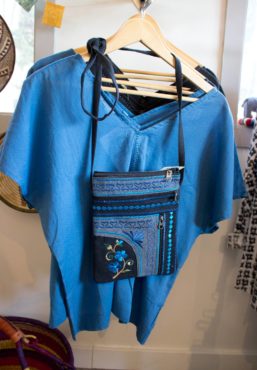 Owning and running a fair-trade store wasn’t Zhu’s first occupation. With a degree in international business, she worked in international freight logistics before deciding to reduce her commute and do something closer to home. Given her background, a retail import store made sense, but as she pointed out, in the beginning, she had no experience in retail.
Owning and running a fair-trade store wasn’t Zhu’s first occupation. With a degree in international business, she worked in international freight logistics before deciding to reduce her commute and do something closer to home. Given her background, a retail import store made sense, but as she pointed out, in the beginning, she had no experience in retail.
“I know I learned more from my customers than they did from me,” she said.
Downtown Port Gamble was the site of her first Tango Zulu store, opened in 2010 in the historic Morrill Pope House.
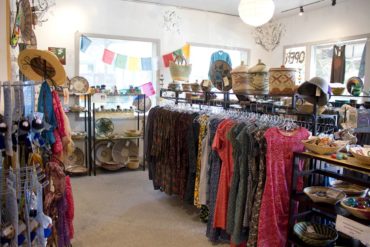 “It was a great place to get my foot in the door,” Zhu explained. “Port Gamble gets a lot of foot traffic, both tourists and locals. And it’s a very supportive, collaborative business community that works together to promote not only our individual businesses but the whole town.”
“It was a great place to get my foot in the door,” Zhu explained. “Port Gamble gets a lot of foot traffic, both tourists and locals. And it’s a very supportive, collaborative business community that works together to promote not only our individual businesses but the whole town.”
Then came a three-year stint running a second Tango Zulu in Pioneer Square before Seattle’s increasing rent and construction congestion forced a decision to shutter. In 2015, she opened her third Tango Zulu shop in Bainbridge Island’s Winslow Green.
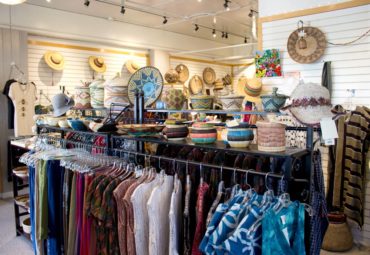 The two locations offer some of the same inventory, but also specialize. The Port Gamble store carries more household goods, with a strong emphasis on baskets. The Bainbridge location retails more seasonal clothing woven and dyed largely by co-ops of women.
The two locations offer some of the same inventory, but also specialize. The Port Gamble store carries more household goods, with a strong emphasis on baskets. The Bainbridge location retails more seasonal clothing woven and dyed largely by co-ops of women.
“I’d always wanted to try a clothing boutique,” Zhu recalled.
Bainbridge provided a customer demographic interested in knowing who made their clothing and willing to pay for eco-conscious textiles at fair-trade price points.
Establishing a high standard for locally sourced fair-trade goods has been part of the stores’ evolution.
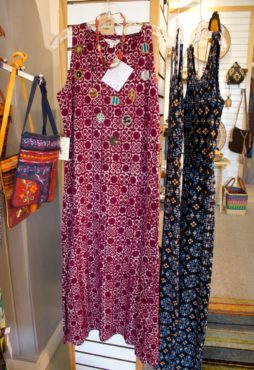 “Historically, retailers and customers thought of fair trade in terms of coffee,” Zhu explained. “There wasn’t much available in clothing and housewares. Eventually big-name retailers like Patagonia began promoting fair trade, but when the idea of fair trade expanded, there was no real regulation or standards. Customers can still buy ‘Africa-inspired’ home goods or clothing made in Bangladesh under terrible working conditions.”
“Historically, retailers and customers thought of fair trade in terms of coffee,” Zhu explained. “There wasn’t much available in clothing and housewares. Eventually big-name retailers like Patagonia began promoting fair trade, but when the idea of fair trade expanded, there was no real regulation or standards. Customers can still buy ‘Africa-inspired’ home goods or clothing made in Bangladesh under terrible working conditions.”
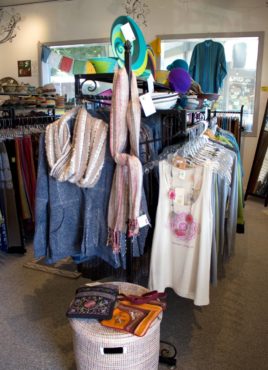 Zhu works with the Fair Trade Federation, the most stringent of the organizations that promote fair-trade goods and practices. She likes that the organization encourages safe and empowering working conditions and environmental stewardship, and that it audits its source businesses to assure artisans get paid fairly and promptly.
Zhu works with the Fair Trade Federation, the most stringent of the organizations that promote fair-trade goods and practices. She likes that the organization encourages safe and empowering working conditions and environmental stewardship, and that it audits its source businesses to assure artisans get paid fairly and promptly.
She also buys directly, working with known artists and co-ops. South Africa is a favorite country for finding high-quality goods.
“There is such variety there,” Zhu said. “Lots of artists leave other African countries, emigrating for a better life in South Africa. I saw my first Zimbabwe binga basket there and we now regularly stock them.”
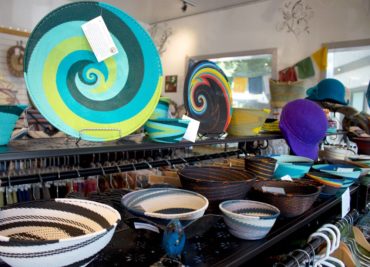 Sourcing directly from artists working in less developed countries requires flexibility from Zhu and her customers. Production and delivery can be delayed by infrastructure issues like power outages, as it was recently for a Zimbabwe co-op she uses to source baskets.
Sourcing directly from artists working in less developed countries requires flexibility from Zhu and her customers. Production and delivery can be delayed by infrastructure issues like power outages, as it was recently for a Zimbabwe co-op she uses to source baskets.
The business’ artwork for its marketing materials reflects the eye-catching colors in the store while supporting an emerging global artist. Through an internet search, Zhu found Aysha Tengiz — at the time, a 16-year-old Turkish illustrator who had emigrated to London. Tengiz is now a successful illustrator in her 20s and Zhu continues to commission her to create all the store’s marketing artwork, including the guitar-strumming leopard on the store’s current poster.
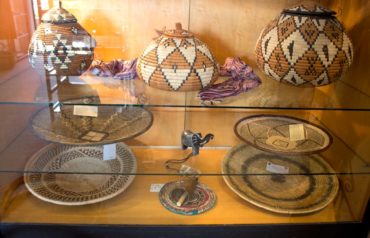 Fair-trade principles extend to Zhu’s values as an employer.
Fair-trade principles extend to Zhu’s values as an employer.
“We pay our employees above average wage and provided leave before the state required it,” she said.
The store does all its own packaging and shipping to reduce plastic waste. And Tango Zulu regularly donates to local causes as well as participating in Port Gamble and Bainbridge’s small business promotion events.
Plans are in place to expand the store’s e-commerce operation.
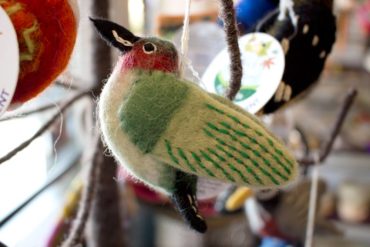 “About 30 percent of our inventory is currently available to purchase on our website,” she said.
“About 30 percent of our inventory is currently available to purchase on our website,” she said.
Growing the e-commerce store will allow Tango Zulu to offer more options and expand its impact on equitable and sustainable trade and business practices.
“I opened Tango Zulu to make a living for my family and our employees,” Zhu said. “But I also did it because I know that there are global craft skills that will be lost entirely. The Zulu people, as an example, may have found that plastic and glass are less work-intensive substitutes for carrying liquids than their functional and traditional palm beer baskets. But if there is a way to showcase their basket craft skills differently as a work of art, then we can contribute to preserving an African art skill and contribute to an income that helps their families eat.”



